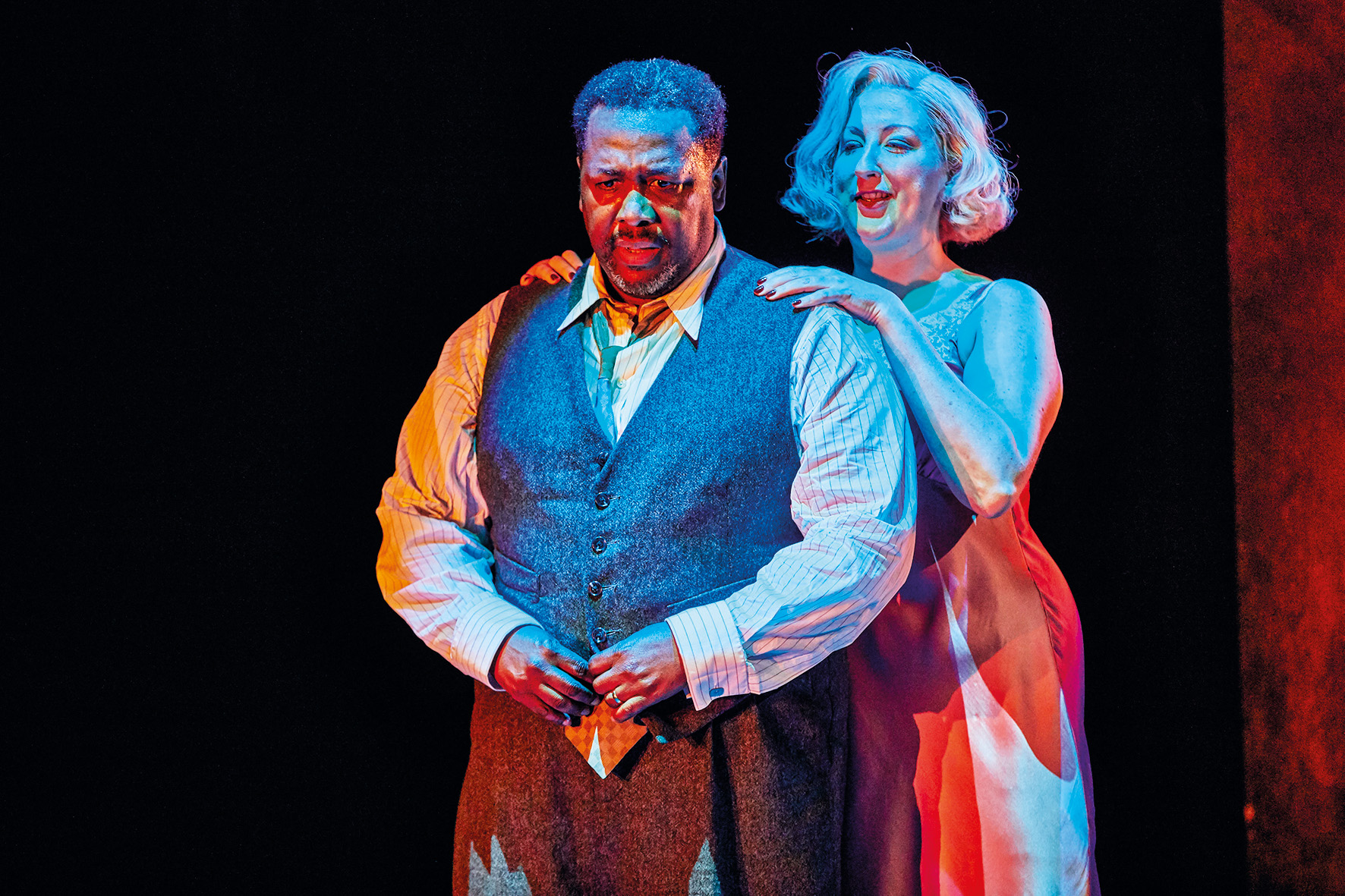
Is there a greater wasted opportunity in theatre than the character of Linda Loman played deadly straight? It used to be said that Ginger Rogers could do anything Fred Astaire did, only backwards and in high heels. Linda faces the same problems as her husband – ageing, financial insecurity, estrangement from their sons – with the added strain of jollying Willy along too. She could be a great counterpoint. Instead, in this Young Vic production, she is a one-dimensional cheerleader.
The genius of Arthur Miller is to find grandeur in ordinary lives, and Death of a Salesman elevates Willy Loman to an emblem of shattered masculine pride. He returns constantly to the theme of manhood. “A man oughta come in with a few words.” “A man who can’t handle tools is not a man.” “A man is not a piece of fruit.” “A man has got to add up to something.”
But Linda is humiliated too. And yet she insists on Willy’s nobility, offsetting the flaws he demonstrates elsewhere. As the critic Rhoda Koenig once wrote, Miller has a tendency to write women as two types: the “wicked slut” or a “combination of good waitress and a slipper-bearing retriever”. Does a woman have to add up to something? Not on this evidence. (Head across the road to Miller’s earlier play All My Sons at the Old Vic, and Sally Field’s Kate Keller is at least intriguingly complicit in her husband’s secret torture.)
Linda’s best speech is in praise of Willy. “I don’t say he’s a great man,” she tells her sons. “But he’s a human being, and a terrible thing is happening to him. So attention must be paid. He’s not to be allowed to fall into his grave like an old dog.” This presents an intriguing question for the director – or in this case, the two directors, Marianne Elliott and Miranda Cromwell: how much irony should be applied to this scene, given that we already know Willy has cheated on Linda? The answer here seemed to be none. It was a straightforward paean.
That affects the reading of other scenes. I was already thrown by the audience’s titters at Willy’s early tics, which are an ominous indication of the mental crisis to come. Then they laughed at his repeated refusals to let Linda speak, even though that scene culminates in Biff confronting his father for shutting her down: “Don’t yell at her, Pop, will ya?”
I mention this not just to mount my feminist hobby horse – can you be a truly great dramatist if you can’t write 51 per cent of the population? – but because the play’s central tension is over Willy’s character. His fate is tragic. But which of the flaws that precipitate his fall belong to him and which to society? His relationship with Linda is central to that calculation.
My desire for Linda-revisionism is also influenced by the fact that this production has been heavily marketed as a fresh interpretation. Here, the Lomans are an African-American family, a casting decision that really works. The four lead actors – Wendell Pierce as Willy, Sharon D Clarke as Linda, Arinzé Kene as Biff and Martins Imhangbe as Happy – produce strong performances on their own merits, as well as investing the story with extra layers of meaning.
In this version, the flaws of society that hold Willy back clearly include racism. It is a reminder that Death of A Salesman was written in 1949. The Jim Crow laws which institutionalised racism in the American South lasted until 1965.
The scene where Willy’s boss casually fires him gains new resonance when the man is not just young enough to be his son, but white too. And when Willy stoops to pick up his boss’s lighter from the floor – a gesture of submission he has just ordered his son not to perform in other circumstances – the humiliation is even more poignant.
The staging is low-key, with Anna Fleischle’s skeletal house holding various elements on wires, to be lowered as required. It is sparse and dreamlike, matching a text concerned with psychological states. The stage directions specify a flute melody at the start – “it is small and fine, telling of grass and trees and the horizon” – and there is music elsewhere, too, which takes full advantage of the talents of Clarke and Kene.
The play was written to slip fluidly between the present and the past, and this occasionally misfires. One scene is staged to the accompaniment of camera clicks, with Kene and Imhangbe doing slo-mo poses throughout. It is designed to suggest (as Miller intended) that these are not memories, but reconstructions, but it just feels mannered and distracting.
What is well-judged, though, is Wendell Pierce’s performance, with his floppy jerking arms, painful bluster and final, childlike despair. The production keeps the period details – the refrigerator certainly looks as though the fan would keep breaking – while lightly asserting that Willy Loman’s fate is a universal possibility under capitalism. He’s washed up, burned out, only valuable for what he can sell. It’s a story about what a man could be, and what he ends up being.
“Death of a Salesman” runs at the Young Vic until 13 July
Death of a Salesman
Arthur Miller
Young Vic, London SE1
This article appears in the 15 May 2019 issue of the New Statesman, Return of the Irish question





